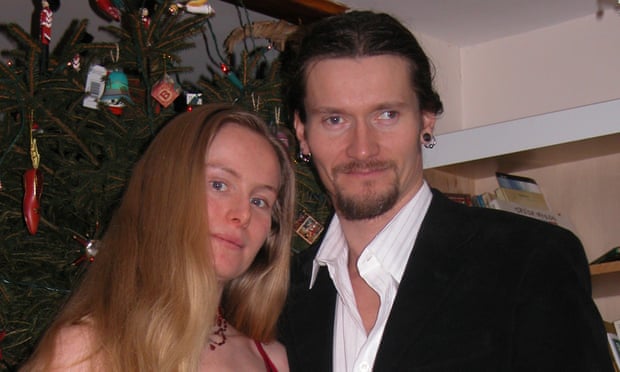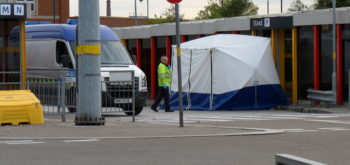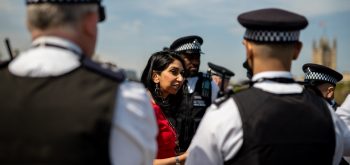Next Wednesday (October 3) a key hearing is due to take place in the Investigatory Powers Tribunal in Kate Wilson’s seven year struggle for justice, following the discovery that her former partner was undercover police officer, Mark Kennedy. Once again the police are attempting to prevent judicial scrutiny of the extent and nature of surveillance that Kate Wilson was subjected to, this time claiming that the disclosure exercise ordered by the tribunal should be abandoned due to the costs and time associated with the process. They argue that a ruling should be made on the basis of facts already admitted. Kate Thomas writes.
Kate Wilson explains: ‘The police are desperate to stop people knowing the truth about these operations and how far up the hierarchy knowledge of these abuses went. They claim to hold 10,000 documents on me. They think they can make a few sacrificial admissions and then shut the rest of the case down by saying their spying operation was so big that it’s too expensive for the court to examine. No – it was totally unjustified. They need to provide disclosure and be held accountable.’

Kate Wilson and Mark Kennedy
Following the police decision to withdraw their defence in Wilson’s civil claim in 2016, she is proceeding in the tribunal with claims for breaches of her rights under Articles 3, 8, 10, 11 and 14 of the European Convention of Human Rights. The tribunal hears Human Rights Act claims concerning allegations of unlawful surveillance by public bodies. Significantly, this is the first time that the tribunal has ever considered an Article 3 claim (‘inhuman or degrading treatment or punishment‘).
Wilson’s claims relate not just to Mark Kennedy, but also to her more recent discovery that at least seven other undercover officers infiltrated her life over an 11 year period.
This is not the first time that the police have attempted to stop this case. Last year, they abandoned their argument that a number of her claims should not be heard as she had failed to bring them in time. And at a hearing in December 2017, the Tribunal rejected the police submissions that her Article 8 and 14 claims should not be allowed to proceed.
In March this year, the police served an amended defence. In the original defence, the police admitted that Kennedy’s sexual relationship with Wilson had amounted to a breach of her Article 3 and 8 rights. The amended defence went further. The police now admitted that Kennedy’s cover officers (plural) and line manager were aware of his close relationship with Wilson, that they ought to have known it was a sexual relationship, and that they acquiesced to the relationship. The defendant acknowledged that the involvement of these other officers increased the severity of the breach of her Article 3 (and 8) rights. For the first time, the police also admitted to breaching Ms Wilson’s Article 10 and 11 rights, albeit only to the extent that the breaches result from her sexual relationship with Kennedy.
For Wilson, the most significant aspect of the new admissions was in relation to the apology she accepted as part of the settlement in her civil claim. She explains: ‘The apology that we received told us that sexual relationships would never be authorised. But now I’m told that the people giving Mark his orders knew. I was misled by the police in a much publicised apology that was supposed to be reparation for their deceit and abuse. It’s sickening.’
Claims arising from the intimate relationship
While it is significant that the police have made some admissions in respect of Mark Kennedy’s direct managers in relation to her Article 3 and 8 claims, these admissions are very limited. It is not admitted that any of them actually knew about the nature of the relationship. Why Kennedy conducted the sexual relationship has not been admitted – was it for personal gratification or, as seems more likely, to maintain his cover and/or obtain intelligence? Was it authorised or was it a result of a failure in supervision? How far up the police hierarchy did the knowledge of the relationship go? Understanding the extent of the Article 3 breach is impossible without answers to these questions and, in particular, the involvement of those further up the command chain.
At the hearing in December the then President of the Tribunal asserted that it wasn’t enough to know about the sexual relationship, and that evidence needed to be produced to show ‘who knew and why no steps were taken to stop it earlier, and whether there is in fact a failed system of supervision’. Indeed, when a key question still outstanding is whether senior police officers, responsible for authorisations under the Regulation of Investigatory Powers Act (RIPA), authorised and approved the breach of her Article 3 rights by the use of a sexual relationship for intelligence purposes, the argument that further investigation is disproportionate holds little weight.
Yet the police submit that, as a result of their admissions, there is little left outstanding in the case and that the Tribunal can now make its rulings. Unsurprisingly Ms Wilson disagrees. ‘The police used tactics like this in the civil claim. At the point when they would have to provide disclosure they withdrew their defence and settled the claim. It’s a damage limitation exercise where they manage the information and stay in control. But there needs to be a proper investigation. It now seems almost certain that senior officers authorised the relationship and the role of the wider police force needs to be fully investigated.’
Other outstanding claims
Of course, Kennedy’s sexual relationship with Wilson forms only part of her claim. The breach of her Article 8, 10 and 11 rights resulting from Kennedy’s actions beyond the sexual relationship, as well as the presence of seven other undercover officers, all conducting surveillance and gathering intelligence on her for over a decade, is denied or not admitted.
Importantly, because she believes that the interference with her private life was enabled by failures in the statutory regime, Wilson is also seeking a declaration that RIPA lacks sufficient clarity and safeguards to satisfy the Article 8 requirement that authorisations under it be in accordance with the law. The police are attempting to persuade the tribunal that it should not consider this part of the Article 8 challenge, nor any of the claims relating to other officers, or her Article 14 claim, largely on the basis that these issues will be considered as part of the Undercover Policing Inquiry.
However, given the very broad terms of reference of the inquiry and the amount of it which now looks set to be heard in secret, this is far from certain. The tribunal previously rejected this argument, and the police have not provided any new reasons as to why it should change its position.
As Wilson explains:
‘It’s essential that the court investigates the claims beyond those directly relating to my relationship with Mark. While the sexual relationship was the most extreme surveillance tactic used against me, it was just one part of a much bigger operation. None of it can be viewed in isolation. All of these officers infiltrated my private spaces and I now believe also sought to direct and influence my political activity. These are hugely important issues that the court needs to properly examine.’
In respect of her Article 14 claim, Professor Zellick, one of three judges presiding over the December hearing, noted the potential importance of the claim stating that ‘if we were to find that there was knowledge and direction’ on the part of senior officers ‘to target women, to encourage and promote and incite sexual relationships’ then it ‘could well give rise to a legitimate Article 14 finding’.
A finding that there is deep rooted prejudice within the police force is only possible if the tribunal permits the disclosure exercise to continue and examines all the relevant facts and evidence. Considering what is already known about the abuse of women through these undercover operations, the tribunal cannot simply allow the police to assert, uncontested, and in the absence of disclosure, that the abuses were isolated mistakes.
Seeking justice
The growing evidence of systemic involvement of the police, and the increasing likelihood that decisions regarding Kennedy’s relationship with Wilson were made much higher up within the institution, are also highly relevant to the remedy that she is entitled to. As are the failures of management, supervision, rules and guidance in the system that Kennedy was operating within, as well as the sheer number of undercover officers who infiltrated her life, which also raises issues of systemic failures.
In order to provide to just satisfaction, namely adequate compensation to reflect the severity of the breaches and declarations by the tribunal of those breaches which properly reflect what happened to her and the wider state involvement, it is necessary to properly understand what happened and examine the system that was in place that allowed it to happen.
However, more importantly to Wilson, the severity of the breaches indicates that she has a right to know what happened and providing this information should form a key part of the role of the Tribunal’s investigation. As she puts it: ‘The courts tend to think about these things in terms of money as reparation, but when you’re dealing with a situation where the damage has been caused by secrets, lies and deception, then actually getting the truth becomes a really important part of reparation.’
On Wednesday evening next week, Kate Wilson and her legal team will be speaking about the case. More here.






